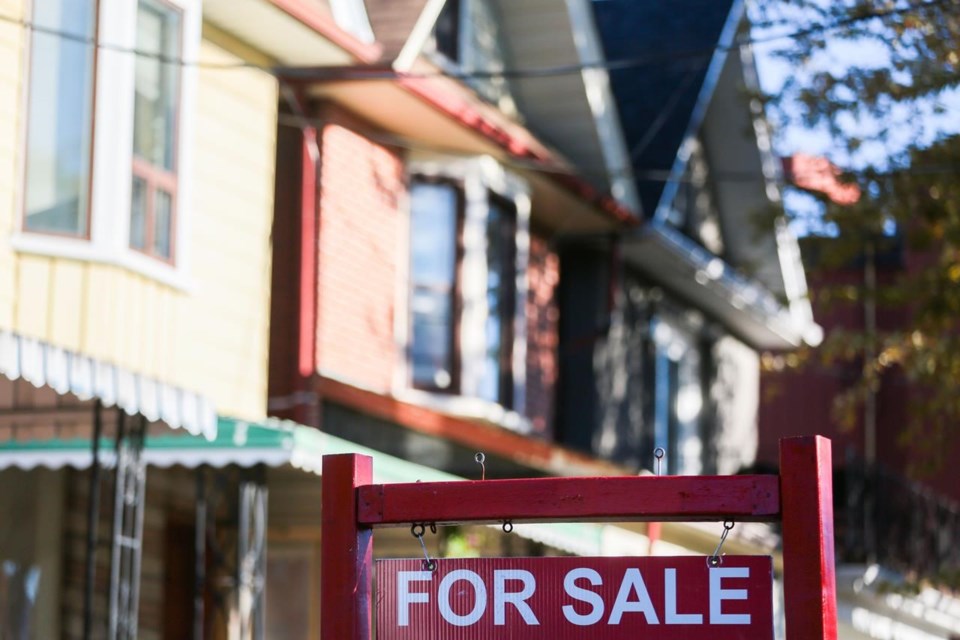With interest rate cuts likely on the horizon, the Canadian Real Estate Association expects the number of homes changing hands this year to grow following a slowdown in 2023.
However, experts say they remain cautious about the timing and scale of a potential rebound.
CREA updated its 2024 housing forecast on Monday as it also reported national home sales data for December.
The association said it expects 489,661 residential properties to be sold this year — a 10.4 per cent increase from 2023 — and the national average home price to climb 2.3 per cent on an annual basis to $694,173.
Noting that Canadian housing markets have remained quiet since the Bank of Canada’s interest rate hikes last summer, the association said there's reason to be optimistic in the new year with expectations for the timing of the first 2024 rate cut pulled forward.
"The real test of the markets’ resilience will be in the spring,” said CREA chair Larry Cerqua in a press release, adding that the data for December offered up "a bit of a surprise in sales numbers to cap the year."
December home sales were up 3.7 per cent compared with the same month in 2022, marking the largest year-over-year gain since August. The actual national average price of a home sold in December was $657,145, up 5.1 per cent from December 2022.
The number of newly listed homes fell 5.1 per cent on a month-over-month basis in December.
CREA senior economist Shaun Cathcart said the December bump likely wasn't the start of the expected recovery, but rather "just some of the sellers and buyers that were holding onto unrealistic pricing expectations last fall finally coming together to get deals done before the end of the year."
"We’re still forecasting a recovery in housing demand in 2024, but we’ll have to wait a few more months to get a sense of what that ultimately looks like," he said.
Some buyers may have been inclined to purchase a home as last year wrapped up in order to get ahead of the anticipated 2024 boom, said Cailey Heaps, president of the Heaps Estrin Real Estate Team in Toronto.
Although borrowing costs are still high, with the central bank holding its key rate at five per cent, she said those looking to make a move now have the advantage of potentially finding good deals on the market due to lower demand and less competition.
"The primary advantage is we will likely see upward pressure on pricing once the rates start to drop," she said.
"You're locking into a higher rate, but ... you just factor it into your purchasing price and your overall budget."
National Bank economist Daren King said data trends from Canada's largest housing markets — Toronto, Vancouver, Montreal and Calgary — suggest November was likely the trough for home sales, but he agreed the strong figures last month were not necessarily "a sign that the real estate market is now on the rise for good."
"We're seeing economic growth decelerating, the job market also is not as good it used to be, we're seeing the unemployment rate increasing, so of course, we'll have some headwinds ahead," King said in an interview.
"When we will have more confidence that the Bank of Canada will start decreasing their interest rate — we're expecting it to decrease in April, probably — at that point, we can expect the real rebound then."
Others feel the recovery might come earlier than that. A separate report released Monday by Royal LePage suggested the Canadian market is showing signs of home price stability, with the aggregate price of a home increasing 4.3 per cent annually to $789,500 in the fourth quarter of 2023.
Buyer sentiment can have an equal effect on market trends as inventory or interest rates, according to Phil Soper, president and CEO of Royal LePage.
“I believe the narrative suggesting that the housing market will rebound only when the Bank of Canada lowers rates misses the mark,” he said.
“The recovery will begin when consumers have confidence the home they buy today will not be worth less tomorrow. We see that tipping point occurring in the first quarter, before the highly anticipated easing of the Bank of Canada’s key lending rate.”
Heaps said the market is anticipating an increase in inventory this year, which adds another layer to the dilemma some buyers face before the cycle of rate cuts gets underway.
"Do you buy something now because you feel you're going to get ahead of the market pricing, knowing that there might be more options in the spring? Or do you wait for more options?" she said.
"That's a very subjective decision that people will make."
This report by The Canadian Press was first published Jan. 15, 2024.
Sammy Hudes, The Canadian Press




